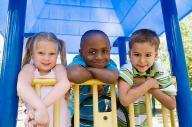 In 2009, the government began a massive effort to collect environmental, genetic, psychological, sociological, educational and other developmental information from 100,000 people from before conception through age of 18. This effort, called the National Children’s Study, or NCS, was an incredibly important, but also a very expensive and labor-intensive study. Collecting information on the same person across development is the gold standard in understanding early markers of disorders like autism, developing strategies to alleviate suffering at different stages of development in childhood disease, and preventing certain life threatening diseases like cancer.
In 2009, the government began a massive effort to collect environmental, genetic, psychological, sociological, educational and other developmental information from 100,000 people from before conception through age of 18. This effort, called the National Children’s Study, or NCS, was an incredibly important, but also a very expensive and labor-intensive study. Collecting information on the same person across development is the gold standard in understanding early markers of disorders like autism, developing strategies to alleviate suffering at different stages of development in childhood disease, and preventing certain life threatening diseases like cancer.
In 2014, the study was shut down after about 5000 people had enrolled. An expert review group had advised the head of the NIH that the methodology used was going to be way too expensive, and entirely too cumbersome. But the NIH still wanted to support longitudinal studies and created a mechanism so that it could be done another way. They took the money that was set aside for the NCS, and applied it to support the extension of existing cohorts. In this way, existing families that had only been interviewed once could be re-contacted again to become longitudinal studies. Additionally, money could be applied to add on to studies so that additional biosamples or behavioral measures could be collected and analyzed.
Earlier this week, the NIH announced the recipient of these awards, which are collectively being called Environmental influences on Child Health Outcomes, or ECHO. In addition to the studies themselves, funding will go to a data coordinating center to make sure the studies are collecting similar measures and they can be put into a common database or repository. There is also money to analyze samples that are collected.
We are happy to announce three studies with relevance to autism that were funded through this mechanism. First, Drexel will lead 14 sites to analyze the baby teeth of 1,713 siblings of children with autism. About 20% will end up with an autism diagnosis, but a high percentage of them who don’t have an autism diagnosis have a developmental concern like language delay or ADHD. They will collect the baby teeth of these siblings, which parents normally save. Researchers can look at the layers of teeth much like botanists can look at the rings of a tree and tie an environmental exposure to a particular window of development. These baby teeth, together with genetic samples collected from the families, will be used to better understand environmental risk factors and genetic influences of ASD.

Finally, the CHARGE or Childhood Autism Risks from Genes and Environment Study, has ben enrolling children since 2003. The last time the children were seen was at the time of autism diagnosis, from age 2-5 years of age. Symptoms of autism change over time, and leaders of the study will be using funding to re-contact CHARGE participants as they reach adulthood. They will assess these individuals at older ages for attention deficit or hyperactivity symptoms; changes in cognitive or adaptive function; changes in severity or diagnosis; and symptoms of anxiety or depression. The new study, called ReCHARGE, is expected to have information on 1,440 individuals with autism or developmental delay. Again, this was not possible without the ECHO funding.
Together, these studies will help researchers better understand the causes of autism spectrum disorders, the link to other diseases and disorders, and of course the life course of people with autism. Thank you to the NIH for providing the support which made these projects possible. If you want to learn more about ECHO – you can find information on the NIH website: https://www.nih.gov/echo.
